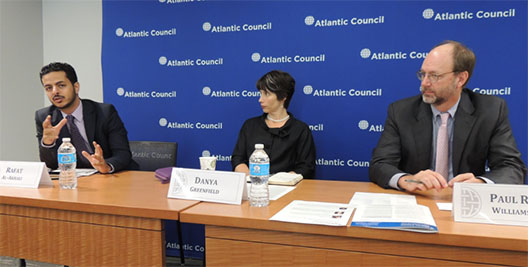 As Yemen’s Constitution Drafting Committee (CDC) begins to work out the details of the country’s proposed federal system, the Atlantic Council’s Rafik Hariri Center for the Middle East launched “The Challenge of Federalism in Yemen,” an issue brief by nonresident fellow Rafat Al-Akhali. Al-Akhali traveled from Sana’a, Yemen to Washington for a discussion on May 28, 2014 on this next critical phase of the transition. The panel included the author and Paul R. Williams, adviser to the CDC and president and cofounder of the Public International Law & Policy Group. Hariri Center acting director Danya Greenfield moderated the discussion.
As Yemen’s Constitution Drafting Committee (CDC) begins to work out the details of the country’s proposed federal system, the Atlantic Council’s Rafik Hariri Center for the Middle East launched “The Challenge of Federalism in Yemen,” an issue brief by nonresident fellow Rafat Al-Akhali. Al-Akhali traveled from Sana’a, Yemen to Washington for a discussion on May 28, 2014 on this next critical phase of the transition. The panel included the author and Paul R. Williams, adviser to the CDC and president and cofounder of the Public International Law & Policy Group. Hariri Center acting director Danya Greenfield moderated the discussion.
Al-Akhali explained that the shift to federalism in Yemen is pursuant to an agreement reached at the National Dialogue Conference (NDC) in hopes that it will help address some of the country’s most pervasive issues like corruption, lack of capacity, and the general detachment of the highly centralized government from its citizens. However, there are a number of obstacles to the implementation of a federal model; namely, many in the South would prefer a weak central government if not outright independence, while, on the other hand, traditional vested interests in Sana’a are likely to resist any devolution of power at all.
Williams likened the current process of negotiating federalism to that of solving a Rubik’s Cube—all parties are trying to solve a single portion of the Rubik’s Cube instead of solving the puzzle as a whole. Every party wants their interests secured first, and this approach is impeding the ability of the CDC to work out details of the constitution. He noted that while there are numerous mandates from the NDC, many of the details on the structure of federalism remain undetermined, and the lack of transparency in this process leaves many Yemenis uninformed and potentially disenfranchised, raising doubts about the transition’s progress.
Still, both Al-Akhali and Williams noted that the transition to federalism is perhaps the best hope for addressing Yemen’s numerous challenges. What remains to be seen is how the CDC will choose to interpret NDC mandates and structure the new system. Just as important is the question of whether a majority of Yemenis will accept the new constitution and federal system.
